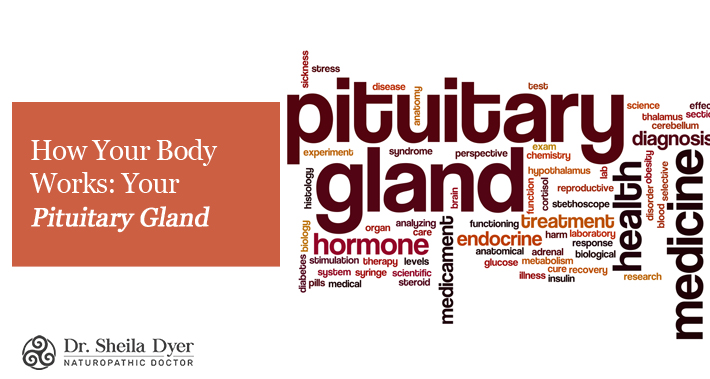
One great way to keep healthy is to have an understanding of how the different parts of your body work.
Knowing the roles of your various organs and glands, and how they all work together will also help you to notice when something isn’t working as it should be.
As a naturopathic doctor in Toronto, I want to help you learn about how your body works – what is considered “normal”, what would be “abnormal” and how to recognize when you might need to seek an expert opinion for your symptoms.
Today I’ll draw on my experience as a hormonal imbalance naturopathic doctor to teach you more about your pituitary gland.
Are you ready to learn all about this important gland?
Let’s go…
What Is Your Endocrine System?
The endocrine system is a series of organs and glands which control the hormones your body uses to function.
It plays a role in a variety of bodily functions including:
- Energy levels
- Metabolism
- Reproduction
- Development and growth
- Stress response
- Mood
In addition to your pituitary gland, other parts of the endocrine system include:
- Hypothalamus
- Thyroid and parathyroid
- Pineal body
- Thymus
- Pancreas
- Adrenal gland
- Ovaries and testis
Because so many autoimmune diseases affect the glands in your endocrine system, naturopathic treatment for autoimmune disorders will often focus on your endocrine systems.
This includes:
- Naturopathic treatments for rheumatoid arthritis
- Naturopathic treatments for type 1 diabetes
- Naturopathic treatments for fibromyalgia
- Naturopathic treatments for Crohn’s disease
- Naturopathic treatments for hyperthyroidism caused by Graves’ disease
- Naturopathic solutions for hypothyroidism caused by Hashimoto’s thyroiditis
- And many others
What Is Your Pituitary Gland?
Sometimes called the “master gland”, the pituitary gland releases hormones which affect other glands including the thyroid, adrenal glands, and reproductive organs.
This important gland is about the size of a pea and located at the base of the brain.
Parts Of Your Pituitary Gland
The pituitary gland is made up by two main parts – the anterior and posterior lobes.
Each lobe is responsible for different types of hormones – let’s break it down.
1. The Anterior Lobe
Some of the hormones creased and secreted by the anterior lobe of the pituitary gland, and their functions include:
- Thyroid stimulating hormone, which activates the production of thyroid hormone
- Follicle stimulating hormone, which promotes estrogen secretion
- Prolactin, which helps with the production of milk in those who are breast or chest feeding
- Luteinizing hormone, which helps with production of testosterone and estrogen
- Growth hormone, which stimulates physical development
- Endorphins, which can help relieve pain
2. The Posterior Lobe
The posterior lobe of the pituitary gland holds two hormones which are created in the hypothalamus and stored by the pituitary gland until they are released.
These hormones are:
- Oxytocin, which stimulates the production of breast or chest milk, as well as stimulating contractions during childbirth
- Vasopressin, which helps to prevent dehydration
Pituitary Gland Health Conditions
There are a variety of conditions which can affect the health of your pituitary gland.
These are often caused by a tumour on or near this important gland.
Let’s have a look at some of the conditions which can impact the pituitary gland.
1. Traumatic Brain Injury
Sometimes traumatic brain injury can have an impact on the pituitary gland.
Damage to this gland may result in issues including communication, behaviou, and memory issues.
2. Cushing’s Disease
In individuals with Cushing’s disease, the pituitary gland secretes excess amounts of adrenocorticotropic hormone.
This stimulates the release of cortisol and may lead to issues such as unexpected weight gain, elevated blood pressure, and weakness.
3. Hypopituitarism
Hypopituitarism is a condition which results in low or no production of hormones.
Insufficient production of pituitary hormones can have an impact on the reproductive system and growth.
4. Acromegaly
Acromegaly is a condition in which the pituitary gland makes an abundance of growth hormone.
As a result, it can lead to excessive growth of the hands and feet in particular.
5. Pituitary Tumor
Although not generally cancerous, pituitary gland tumours can affect the release of pituitary hormones.
Additionally, they can impact other areas of the brain and may result in issues such as headaches and vision loss.
How To Know If You Have A Pituitary Issue
Issues with the pituitary gland can result in a number of different symptoms, due to the variety of functions pituitary hormones play in the body.
Some symptoms to watch for, which could be a sign of a need for further medical attention include:
- Hypertension
- Sleep issues
- Memory problems
- Unusual hair growth
- Headaches
- Tiredness and weakness
- Unexplained weight gain
- Depression and mood swings
- Issues related to the reproductive system, including irregular or painful periods and erectile dysfunction
How To Keep Your Pituitary Gland Healthy
If you want to be proactive about pituitary gland health, there are a number of nutrients to consider.
Some nutrients which are important for healthy pituitary function include:
- Magnesium
- Manganese
- Vitamin E
- Iodine
With these nutrients in mind, some foods to consider adding to your diet to promote pituitary gland health include:
- Leafy greens
- Nuts
- Wheat
- Kelp
- Seafood
In addition, taking measures to reduce stress in order to limit the release of cortisol, and incorporating regular exercise into your routine will help with both pituitary gland and overall health.
Book An Appointment With Dr. Sheila Dyer, ND, Today
Do you have a condition which affects the health of your pituitary gland?
Or perhaps you’ve been experiencing some of the symptoms noted in this article and want to try to get to the bottom of their cause.
I’m Dr. Sheila Dyer, ND, a naturopathic doctor in Toronto, Ontario and I want to help.
I’ll help you find the source of your health issues, and work with you to find solutions which work for you.
Book a consultation with me today.
If you have questions about naturopathic medicine, or would like to start with your first consultation, contact me, and let’s book an appointment.
Dr. Sheila Dyer, ND1080 Dovercourt Rd,
Toronto, ON M6H 2X8
(416) 554-5135
► https://g.page/DrSheilaDyerNd
Dr. Sheila Dyer is a Naturopathic Doctor and a practicing registered nurse offering holistic healthcare with a scientific focus
